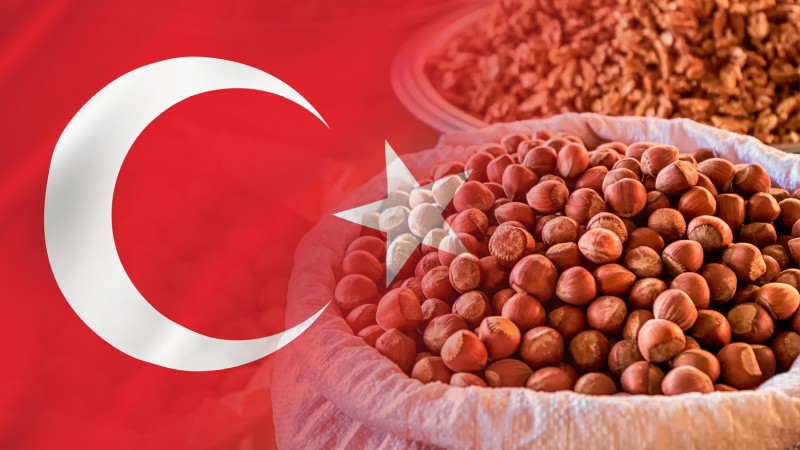Hazelnuts: "The world has been a chaotic place to live in"
January 6, 2023 at 1:00 PM ,
Der AUDITOR

Which were the major difficulties faced by the hazelnut market in 2022? Were they mainly caused by the ongoing threat of the Ukraine war and the resulting energy crisis and inflation, or do you think they would have occurred in a calmer year as well?
I believe most of the difficulties faced by the hazelnut manufacturers in Turkey arose domestically. First of all, although there's an active war going on between Russia and Ukraine, none of these countries experienced the devaluation in their currency and inflation rates as high as Turkey. Turkey has been going through an unprecedented economic crisis and the consequences of this situation (high inflation, increasing costs, less loan availability, new regulations etc.) hit the hazelnut market, which depends heavily on cash flow, quite hard.
So, it is crucial to define the "calmer" year precisely - for us, one day in Turkey is worse than any day in Europe (war, inflation etc. combined). We have been observing the direction that the country was heading (even before the war) and we were pretty sure that this situation would happen, and it did, regardless of the war or global inflation crisis.
So in a nutshell, although the war and global crisis played a significant role, the biggest problem of the hazelnut market in Turkey was the mismanagement of the country.
Which effects of the coronavirus pandemic are still noticeable?
Except for China, we are not experiencing any effects of the pandemic anymore. But for China, we are still unable to travel there without quarantining for at least 3 weeks. Even the document cargos are kept in centers for at least 10 days before they are released to the receiver. Some cities still have travel restrictions which eventually affect consumer behavior. At the beginning of the season, all our buyers indicated that they had existing stocks because of the pandemic and they should sell those first. Other than that, all countries seem to be over the pandemic and back to normal.
In most markets, prices for feed and food commodities have increased significantly over the past year. Do you think that buyers will have to adjust to these higher prices in the long term, or do you expect prices to decline again?
This is a tricky question and should be dealt with carefully since prices of some commodities increased because of utility/ production costs and prices of some commodities increased due to supply/demand and some increased for both reasons! I truly believe we will not be seeing any decrease in utility costs (electricity, gas, labor etc.) within the foreseeable future, hence no decrease expectations for essential foods. However, we are experiencing sharp price decreases for dried nuts and fruits due to lack of demand (only hazelnut prices are not going down because of the TMO, otherwise we would have seen sharp decreases as well) in the past few months.
Has the demand situation changed compared to 2021 and 2020? Do you think that some buyers and processors have had to readjust their needs?
The demand situation changes every year since the world has been a chaotic place to live in since March 2020 when the pandemic hit. The demand hit a record low after that but was in a recovery phase once international travel was allowed again. We were quite happy with the demand in the beginning of the 2021 season, but then the war followed by a global economic recession wounded the demand severely. It is obvious that demand for hazelnuts decreased significantly since the export numbers this year are down around 20% although the price is 20% cheaper. We definitely have re-adjusted our needs and will have to re-adjust in the future due to ever changing global and domestic conditions.
Furthermore, climate change and crop problems are real and pose a threat to all types of food and feed around the world and will most likely continue to do so. How would this affect the hazelnut market in the future and what could businesses in this industry do to improve this situation?
Considering the global hazelnut production data for the past few years, we cannot find any signs of climate change or crop problems affecting the production. In the 2022 season, world's hazelnut production hit a record high and will be increasing in the future due to new plantations in countries such as the USA, Chile and China. Climate change is indeed a concerning issue, but it's hard to comment on its effect on hazelnut production.
Considering the current crises (pandemic, energy, wars, climate change etc.), what do you think the hazelnut market has to prepare for in the coming year? Are there any major consequences to be expected for the 2023/2024 season in terms of supply and demand?
Indeed there are numerous things to be considered since all our costs went through the roof including gas, electricity, labour, packaging, ingredients etc. Managing finances became an art form in Turkey due to ever changing regulations and uncertain market conditions. The demand for hazelnuts is shrinking whereas other countries in the world are increasing their production. When we combine all these together, we can clearly see that we need to restructure our resources, anticipate the demand precisely and prepare ourselves for the next seasons accordingly. Companies in Turkey, especially the ones without an international partner or owner have become very vulnerable in finances as banks refrain from loans or assisting the companies.





